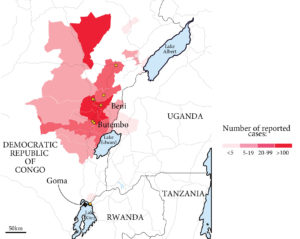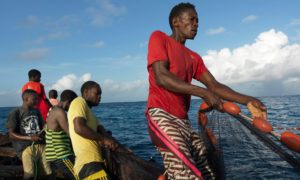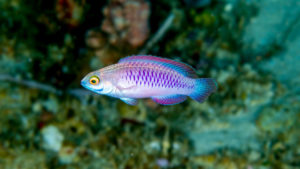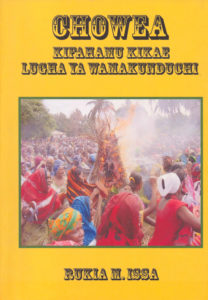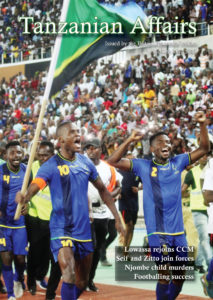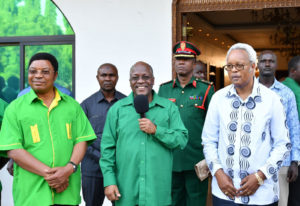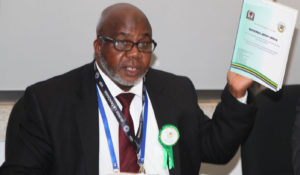by Ben Taylor
Lipumba and Seif, CUF and ACT
The long-running tug-of-war for the control of Civic United Front (CUF) reached a conclusion in March, when the high court ruled in favour of Prof Ibrahim Lipumba as the legitimate national chair of the party. This set off a chain reaction of moves involving the other CUF faction – led by former Vice President of Zanzibar, Maalim Seif Sharif Hamad – and other opposition parties, that will radically change opposition politics on Zanzibar, and could also have a major impact nationwide.
Maalim Seif responded to the court’s decision by immediately resigning from CUF and joining the Alliance for Change and Transparency (ACT Wazalendo), bringing many thousands of his supporters with him. ACT is led by Zitto Kabwe, the outspoken MP for Kigoma Urban.
The dispute between Prof Lipumba and Mr Hamad has roots in the lead-up to the 2015 election, when Prof Lipumba resigned his position as CUF party chair in protest at the selection of former Prime Minister Edward Lowassa as candidate for President representing the opposition coalition, UKAWA, of which CUF was a prominent member. Several months following the election, Prof Lipumba rescinded his resignation letter and attempted to take control of key party bodies and assets, including party funds.
The party faction allied to Mr Hamad, the 2015 UKAWA candidate for President of Zanzibar, resisted this move, leading to the involvement of the Registrar of Political Parties, Judge Francis Mutungi. Judge Mutungi decided in favour of Prof Lipumba, and the high court has now upheld his decision.
Prof Lipumba, however, may find himself in control of a hollowed-out party. Mr Hamad acted swiftly to defect to ACT Wazalendo, bringing his supporters – thought to constitute the vast majority of the party membership in Zanzibar, where the party has its strongest support – with him.
Even before Mr Hamad made his announcement, the direction of travel was clear, with CUF supporters removing CUF flags and repainting party branch offices around Zanzibar in the purple colours of ACT. It has been reported that many or most of the CUF offices and the furniture and equipment they contain actually belonged to party members rather than to the party itself, hence Mr Hamad’s supporters were able to take the offices and equipment with them into their new party.
“We are rebranding the offices as directed by higher authorities,” said the CUF secretary for Chakechake District in Pemba, Mr Saleh Nassor Juma. He said Mr Hamad has the people who were ready to work with him in any political party he chooses to go to.
Speaking just hours after the high court ruling was announced, Mr Hamad held a press conference in Dar es es Salaam, at which he stated that he has no intention to “continue squabbling over the court’s decision.” “Suffice it to say that our intention now is not to continue with court disputes. It’s enough. Political struggles have to continue,” Mr Hamad said. “The platform which we have decided to use to continue the struggle for democracy is the Alliance for Change and Transparency (ACT-Wazalendo) party,” declared Mr Hamad.
Asked why he chose ACT-Wazalendo and not another opposition party, Mr Hamad said that he did so because the party’s conditions were more acceptable. He didn’t name the conditions, saying that it was an internal party issue.
Reacting to the decision, Prof Lipumba said he was saddened that Mr Hamad took such a decision but not surprised. “We had already fired him from his position as party secretary general,” Prof Lipumba said.
ACT Wazalendo leader Zitto Kabwe welcomed Civic United Front (CUF) members joining his party, arguing that this gives ACT a whole new direction and stature in the country’s politics. “This signals a positive direction of the country’s opposition and its struggles for democracy in general,” said Mr Kabwe. “Efforts to build a strong coalition among the opposition parties are mandatory considering the current political circumstances,” he said.
Mr Kabwe handed over membership cards to Mr Hamad, former CUF Director of International Relations Ismail Jussa, former CUF Deputy Secretary General for Zanzibar, Nassor Mazrui, and the UKAWA candidate for Vice President of Tanzania in 2015, Juma Duni Haji, among others. Mr Haji was named as the new deputy leader of ACT Wazalendo.
Speaking shortly after the event, Mr Hamad said. “I’m speechless. I thank ACT-Wazalendo for giving us this grand reception.” He showered praise on his host, Mr Kabwe. “He’s dynamic, energetic, visionary and brave,” said Mr Hamad. “We are officially ACT-Wazalendo members from today. This country needs to go back to its democratic principles. We’ve to keep up the fight towards that direction,” said Mr Hamad. He also cautioned against the use of violence for their hard work will bear no fruit. “We have to come up with alternative ways, that ensure that democratic values are restored peacefully,” he said.
Political commentator, Jenerali Ulimwengu, described Mr Hamad’s move to ACT as “a potential game-changer. ACT may be a tiny organisation with only one Member of the Union Parliament, its founder Zitto Kabwe. But Kabwe is a smart politician.” “Lipumba has literally nothing left to deal with,” he added, explaining that Seif can still count on the support of most former CUF supporters on Zanzibar and some pockets of supporters on the mainland.
Mbowe released from custody
On March 7, Freeman Mbowe, the chair of Tanzania’s leading opposition party, Chadema, was released on bail after winning an appeal against a contempt of court ruling. Mr Mbowe and his co-accused Esther Matiko, also a Chadema MP, were both released after spending nearly four months in prison.
The two had been denied bail in November last year for failing to show up for a court hearing. At the time, Mr Mbowe said he had been unwell while Ms Matiko said she had been on parliamentary duty outside the country.
Mr Mbowe, Ms Matiko and seven other top party leaders are facing charges of sedition, incitement to violence and holding an “illegal rally” in February 2018 that led to the death of a female student, who is believed to have been killed by a stray police bullet.
High Court Judge Sam Rumanyika ruled that their rights had been violated and ordered their immediate release on bail. “I have never seen such a case in all my time as a judge,” he said, adding it was “dangerous to deny an accused bail without a valid reason.”
“I order that Mr Mbowe and Ms Matiko be freed immediately,” the judge ruled. They must report to the court once a month until their appearance with the seven co-accused in the protest trial.
Earlier the same day, Morogoro Resident Magistrate’s Court released two other Chadema MPs, Mr Peter Lijualikali and Ms Suzan Kiwanga, and six other party members. The court noted that the state’s arguments were not sufficient to deny bail to the suspects. The accused were arrested on February 25, accused of setting fire to a police station in 2017.
Lissu to return?
Prominent opposition politician, Tundu Lissu, has said that he is “more than ready” to run for the presidency of Tanzania in 2020 if his party wants him to. Mr Lissu, who is chief whip for the Tanzanian opposition party Chadema, is currently living in Belgium where he has been undergoing medical treatment after an assassination attempt in Tanzania in 2017. He has undergone 20 operations.
In a televised interview on BBC World News, he said would return to Tanzania when the doctors declared him “fit to go”. When he returned, he added, the government would have a responsibility to ensure he was safe.
During his absence from Tanzania, and as his health has improved, Mr Lissu has made numerous appearances in the international media and at public events in Europe and North America. He has repeatedly told the story of the attempt on his life, accusing the government of being behind the attack and of failing to investigate the case properly. He also complained that the parliament of Tanzania was no longer paying his salary, though he had not been given neither any notice to this effect nor any explanation.
Following one such public appearance, the Ambassador of Tanzania in Germany, Dr Abdallah Possi, responded publicly. “The people of Tanzania – and, indeed, his parliamentary constituents (in Singida East) – would have expected him, if he has now recovered and is able to travel, to go back home and continue his representative and other public duties,” the ambassador stated.
Home Affairs minister Kangi Lugola said he is surprised that the police have until now not arrested Mr Lissu. “I am surprised why the police haven’t arrested Mr Lissu just like they have been arresting loiterers. He has been wandering around the globe, while insisting that he is still sick,” said Mr Lugola.
Changing the rules of the game
At the end of January, Tanzania’s parliament passed amendments to legislation that give sweeping powers to the government-appointed Registrar of Political Parties, a move that opposition legislators say will cement one-party rule. The Act was signed by President Magufuli two weeks later and gazetted ten days after that, which makes the new law operational.
The amendments give the Registrar the power to demand any information from parties, to intervene in parties’ internal decision-making processes, and to suspend or cancel party registration. They also introduce tight restrictions on political party mergers and coalitions.
Critics say the amendments will prevent opposition parties from making an effective challenge to President Magufuli and the ruling CCM party in next year’s general election and this year’s local elections. Opposition leaders said the legislative changes would effectively criminalize political activity and turn Tanzania into “a de facto one-party state”.
“You can’t have a constitution that allows freedom of association then give someone powers to revoke that freedom of association,” said Zitto Kabwe, the leader of the opposition ACT-Wazalendo party.
Esther Bulaya, an MP with Chadema, said the legislation would give the registrar of political parties “excessive powers” to interfere with internal affairs of political parties, including stripping individuals of party membership and removing them from leadership positions.
But CCM MPs argued that the amendments give the registrar much-needed authority to act as a referee and ensure political parties do not embezzle subsidies from taxpayers and that they hold transparent internal leadership elections. The legislation aims to enhance transparency and accountability, said Jenista Mhagama, the minister of state in the prime minister’s Office responsible for parliamentary affairs.
Within weeks of the Act being enacted by parliament, the Registrar of Political Parties, Mr Francis Mutungi, issued a notice of intention to deregister ACT-Wazalendo over reported breach of the Act.
In his letter, Mr Mutungi said ACT-Wazalendo had lost eligibility of being a political party, citing the party’s failure to submit an audit of its 2013/14 financial accounts, and accusing the party of breaking the law by allowing its supporters to burn CUF flags and using religious sentiments following the defection of CUF members to ACT (see previous article.)
Mr Kabwe dismissed these claims, saying his party had not broken any law. He described the allegations as “baseless”, and a “personal vendetta”. According to him, the party’s 2013/2014 financial records were submitted to the office of the Controller and Auditor General (CAG) as the law requires. Further, he disowned those accused of burning CUF flags, saying they were not ACT-Wazalendo members. “Our party will not be deregistered because of us breaking laws, but rather because of the State wanting to,” he said.
A group of civil society organisations spoke up in defence of ACT. Ms Felista Mauya, the director of human rights, monitoring and accountability with the Legal and Human Rights Centre (LHRC), described the threat of deregistration as “extreme”.
“In a democratic country that follows the principles of justice and transparency, we did not expect the registrar to issue such a strong statement on allegations that have not yet been proven,” she said, adding that the letter was issued prematurely and contained many allegations that could be have been discussed between the party and the registrar’s office.
Ms Mauya said opposition parties were operating in a climate of fear where internal meetings were being violently broken up or expressly banned. “It was only a few days ago that an internal meeting organised by ACT-Wazalendo was stopped by police without considering the fact that political parties have a right to conduct meetings,” she said.
In April, four opposition parties lodged a lawsuit at the East African Court of Justice (EACJ) over the Political Parties Act amendments. The case bas been brought by Chadema chair, Freeman Mbowe, together with Zitto Kabwe and Seif Sharif Hamad of ACT Wazalendo.
Mr Mbowe explained that the basis of the case is that the new Act contravenes the terms of establishment of the East African Community (EAC).
“We are opposing the whole act and we request the EACJ to stop this law from implementation until the basic case is heard,” he said. He added that the law “criminalizes democracy in Tanzania”.
The East African Court of Justice very recently judged a similar case relating to the Media Services Act, which critics have argued introduces excessive restrictions on freedom of the press. In this case, the EACJ ruled that several sections of the Media Services Act “violate the Treaty for the Establishment of the East African Community”. The judgement stated that any restrictions on freedom of expression are only acceptable when they are narrow, clearly specified & clearly justified. Those bringing the case against the Political Parties Act look to be hoping for the court to reach a similar verdict.
